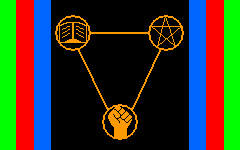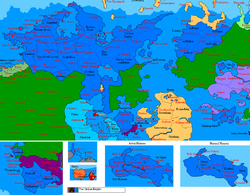Gralus: Difference between revisions
No edit summary |
No edit summary |
||
| Line 19: | Line 19: | ||
|maps = 12.4-Present | |maps = 12.4-Present | ||
}} | }} | ||
The Gralan Empire was formed as a union between the three states of [[Novatainia]], [[Toketi]] and [[Relaram]]. Though Novatainia and Toketi had once joined together in the [[Confederacy of Gralus]], the ability to leave the Confederacy had resulted in it's eventual demise. A year later, the Gralan Empire was formed with the firm commitment that the member nations would not leave - they fully surrendered their sovereinty and became one nation. More than a year later, the Gralan Empire remains a strong nation, at the forefront of those areas Novatainia and Toketi were always famous for: Magic, Roleplaying and Recwar. | |||
==Government== | ==Government== | ||
The Gralan Empire has three major levels of government - National, Provincial and Local. At the national level, the [[Triumvirate]] rule the three separate areas of Domestic, External and Justice. At the provincial level, each province organises its own leadership, generally continuing the forms of government they had upon joining. And within each province, local government is provided for different areas of the land, generally provided by a single person. | |||
It should be noted that the government of the Gralan Empire is strictly [[IC/OOC Distinction|IC], and gralans maintain a strict distinction between their IC rulers and OOC power. | |||
===Triumvirate=== | ===Triumvirate=== | ||
At the national level, Gralus is led by the Triumvirate of Emperor, Lord General and Chief Justice. Each has a separate sphere of influence defined by the [http://novatainia.org/Gralus/phpBB3/viewtopic.php?f=10&t=1000 Gralan Constitution], and where their areas of power overlap, each triumvir involved much agree. No Triumvir is higher than any other. | |||
====Emperor==== | ====Emperor==== | ||
His boldness, the Emperor, is the supreme ruler of domestic affairs within Gralus. He is the Custodian of the Happiness of the People, responsible for enforcing the Law of Gralus when dealing with domestic affairs. Any laws he makes supercede provincial laws; his lawmaking powers within domestic affairs are only restricted by the Constitution and the Bill of Rights. | |||
Some dissatisfaction during the reign of Emperor Nicholas the Mad led to constitutional reform towards democracy, allowing citizens the ability to propose laws and veto Imperial laws. To date, this power has not been used, and the Emperor retains the power to make laws without requiring anyone else to vote on them. | |||
====Lord General==== | ====Lord General==== | ||
His craftiness, the Lord General, is the supreme ruler of external affairs for Gralus. He is the Custodian of the Safety of the People, responsible for enforcing the Law of Gralus when dealing with foreign affairs and for organizing the defense of the Empire against external threats. He heads up both diplomatic efforts (including trade) and the Imperial Army. Depending on who holds the position of Lord General, they generally focus on one of those two areas and leave their heir responsible for the other area. | |||
The Lord General being the custodian of the safety of the people led to some constitutional confusion in the case of civil wars. Though he controls the Imperial Army, a purely civil war is a domestic affair and therefore within the realm of the Emperor. After being appealed to the Chief Justice, it was decided that the Lord General could only intervene in domestic civil wars (within his capacity as Lord General) if requested by the Emperor; but if foreigners became involved he could intervene against them freely. | |||
====Chief Justice==== | ====Chief Justice==== | ||
His justness, the Chief Justice, is the check and balance upon the other areas of government. He is the Custodian of the Liberty of the People, responsible for enforcing his word as he sees fit to ensure that no other part of the government violates it. In practical terms, he ensures that laws do not violate the constitution, interprets the constitution, and acts as a check upon the power of provinces. | |||
Thus far, the Chief Justice has been the most stable member of government, not causing major upsets, missing heirs or being accused of terrorism. | |||
====Heir==== | |||
Upon taking office, an heir is appointed for each Triumvir by one of their counterparts, and approved by the Triumvir in question. Should the triumvir die, resign or be removed from office by a vote of no confidence, their heir takes over; and most Triumvirs have their heir assist during their reign. This makes it important that each Triumvir has an heir; the nation was put into some turmoil by the first Emperor being assassinated without yet having declared an heir, leaving a temporary power vacuum. This led to a constitutional ammendment giving citizens the right to elect the heir to a Triumvir in the case of an emergency; or when an heir has not been appointed within a month. | |||
===Provinces=== | ===Provinces=== | ||
Revision as of 03:37, 29 August 2010
 | |
| Official language | Common (English), Tokish |
|---|---|
| Capital | Shelsa |
| Largest cities | Novatica, Rielrar, Miedo |
| Website | Gralan Wiki |
| Forum | Gralan Forum |
| Number of citizens | 10-20 |
| Number of active citizens | 5-10 |
| Date founded | 15th April 2009 |
| Government | Triumvirate |
| Current leader | Emperor |
| Currency | GELT |
| National animal | Squirrel |
| National fruit/food | Pineapple |
| National drink | Chelkran Dragonwater |
 | |
| Map versions | 12.4-Present |
The Gralan Empire was formed as a union between the three states of Novatainia, Toketi and Relaram. Though Novatainia and Toketi had once joined together in the Confederacy of Gralus, the ability to leave the Confederacy had resulted in it's eventual demise. A year later, the Gralan Empire was formed with the firm commitment that the member nations would not leave - they fully surrendered their sovereinty and became one nation. More than a year later, the Gralan Empire remains a strong nation, at the forefront of those areas Novatainia and Toketi were always famous for: Magic, Roleplaying and Recwar.
Government
The Gralan Empire has three major levels of government - National, Provincial and Local. At the national level, the Triumvirate rule the three separate areas of Domestic, External and Justice. At the provincial level, each province organises its own leadership, generally continuing the forms of government they had upon joining. And within each province, local government is provided for different areas of the land, generally provided by a single person.
It should be noted that the government of the Gralan Empire is strictly [[IC/OOC Distinction|IC], and gralans maintain a strict distinction between their IC rulers and OOC power.
Triumvirate
At the national level, Gralus is led by the Triumvirate of Emperor, Lord General and Chief Justice. Each has a separate sphere of influence defined by the Gralan Constitution, and where their areas of power overlap, each triumvir involved much agree. No Triumvir is higher than any other.
Emperor
His boldness, the Emperor, is the supreme ruler of domestic affairs within Gralus. He is the Custodian of the Happiness of the People, responsible for enforcing the Law of Gralus when dealing with domestic affairs. Any laws he makes supercede provincial laws; his lawmaking powers within domestic affairs are only restricted by the Constitution and the Bill of Rights.
Some dissatisfaction during the reign of Emperor Nicholas the Mad led to constitutional reform towards democracy, allowing citizens the ability to propose laws and veto Imperial laws. To date, this power has not been used, and the Emperor retains the power to make laws without requiring anyone else to vote on them.
Lord General
His craftiness, the Lord General, is the supreme ruler of external affairs for Gralus. He is the Custodian of the Safety of the People, responsible for enforcing the Law of Gralus when dealing with foreign affairs and for organizing the defense of the Empire against external threats. He heads up both diplomatic efforts (including trade) and the Imperial Army. Depending on who holds the position of Lord General, they generally focus on one of those two areas and leave their heir responsible for the other area.
The Lord General being the custodian of the safety of the people led to some constitutional confusion in the case of civil wars. Though he controls the Imperial Army, a purely civil war is a domestic affair and therefore within the realm of the Emperor. After being appealed to the Chief Justice, it was decided that the Lord General could only intervene in domestic civil wars (within his capacity as Lord General) if requested by the Emperor; but if foreigners became involved he could intervene against them freely.
Chief Justice
His justness, the Chief Justice, is the check and balance upon the other areas of government. He is the Custodian of the Liberty of the People, responsible for enforcing his word as he sees fit to ensure that no other part of the government violates it. In practical terms, he ensures that laws do not violate the constitution, interprets the constitution, and acts as a check upon the power of provinces.
Thus far, the Chief Justice has been the most stable member of government, not causing major upsets, missing heirs or being accused of terrorism.
Heir
Upon taking office, an heir is appointed for each Triumvir by one of their counterparts, and approved by the Triumvir in question. Should the triumvir die, resign or be removed from office by a vote of no confidence, their heir takes over; and most Triumvirs have their heir assist during their reign. This makes it important that each Triumvir has an heir; the nation was put into some turmoil by the first Emperor being assassinated without yet having declared an heir, leaving a temporary power vacuum. This led to a constitutional ammendment giving citizens the right to elect the heir to a Triumvir in the case of an emergency; or when an heir has not been appointed within a month.